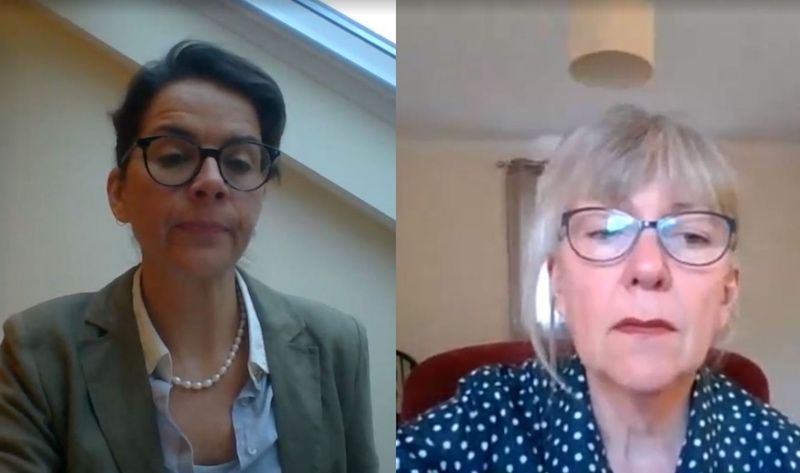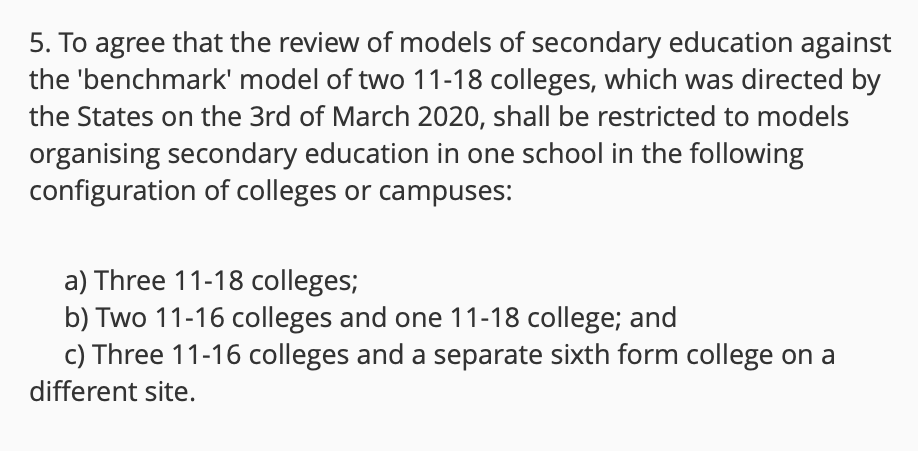


The politician heading up the transformation of secondary education "is hoping" to complete the review of different models in the next two months, but has come under fire for refusing to answer questions in the States about its content, fuelling concerns that previously-approved resolutions have been "changed or ignored".
A protracted exchange between ESC President Andrea Dudley-Owen and Deputy Yvonne Burford did not yield the answers the Scrutiny President was looking for, as she attempted to tease out whether any of the educational models agreed to in a States resolution last March had been dropped.
Deputy Dudley-Owen stuck to her guns, saying her predecessors had been criticised for a lack of engagement and that she was determined not to "risk" her committee facing the same accusations by elaborating on the ongoing review before "meaningful engagement" with school staff and union reps has taken place.
In her answers to written questions from Deputy Peter Roffey last month, Deputy Dudley Owen said her committee intended to benchmark educational models against the current four-school model instead of the currently-approved but paused two-school model.
The ESC President said then that a model containing three, 11-16 schools and a co-located 6th form was being included "primarily for comparison purposes as the "committee has questions around the equity of such a model."
Pictured: Deputy Tina Bury sought assurances that ESC would return to the States if it wanted to rescind resolutions that have already been approved by the Assembly.
On this occasion, Deputy Dudley-Owen would not be coaxed into answering questions on the subject.
"I will not be drawn into any further discussion on the work of the review in a public arena at this time unless and until we have been able to engage meaningfully with all our key stakeholders," she said.
Deputy Tina Bury sought Deputy Dudley-Owen's agreement that "States resolutions cannot be ignored or changed at will by a committee", however the ESC President was "reluctant to be drawn into a conversation about how committees should be going about their work."
Deputy Dudley-Owen was more forthcoming to Deputy Gavin St Pier's enquiry into whether ESC would be returning to the States with a policy letter by the time stipulated in the pause-and-review requete.
"The committee is hoping to adhere to the timeline that we originally had been looking at which is before the end of quarter one to present the policy letter to the States."

Pictured: Resolution 5 of the 'Education: Next Steps' policy letter approved by the States in March 2020.
Deputy Dudley-Owen, who led that successful requete last year, acknowledged that the island's financial position had suffered from the pandemic in the 10 months since.
Deputy Yvonne Burford: In response to a recent Rule 14 question to the committee by Deputy Roffey, it was stated that the committee intends to broaden the review it now owns, by adding the current transitional model with four schools as a benchmark against which the model being reviewed will be assessed. Focussing on the word ‘broaden’, can the president confirm that no models have been dropped from the review? In other words, that each of the school models the committee is required to review as part of the extant resolution of March 2020, remain a full part of the review?
Deputy Andrea Dudley-Owen: I thank Deputy Burford for her question. The committee wants to fully own the work that is underway to find an appropriate model for secondary education in Guernsey and we will continue with this work at pace, but as I have stated before, not in haste.
We are also very mindful that this work is running in parallel with the Policy & Resources’ Committee’s work to refocus the strategic priorities in line with the island’s actual financial position which I fear will be further impacted by the sad emergence of covid-19 in our community.
The previous committee was criticised for a lack of engagement with staff and schools, it is not for me to speculate about that criticism now, but that was the perception and my committee will not risk a repeat of that.
We plan to engage with the right stakeholders at the right time. It goes without saying that we recognise States members are a key stakeholder group, however they are not the only one. For this reason, I am sure Deputy Burford will understand that I will not be drawn into any further discussion on the work of the review in a public arena at this time unless and until we have been able to engage meaningfully with all our key stakeholders. To do otherwise would be to do our hard-working staff and their representative bodies a disservice.
YB: I fully understand and agree that Deputy Dudley-Owen and her committee have a difficult and indeed unenviable task. Not only that no outcome will please everyone, but it’s quite possible that no outcome will please the majority. I agree that this work should not be done in haste. Nevertheless, Deputy Dudley-Owen has entirely sidestepped my question, so I will put it another way.
Do the committee intend to depart from the resolutions of the 18 March 2020 policy letter, specifically resolution five of that policy letter and if so do the committee intend to bring a policy letter to rescind that resolution and replace it with new directions?
ADO: As I have reiterated already today to Deputy Burford, I will not be drawn into any further work on the review in a public arena at this time.
YB: I will rephrase the question once more, perhaps in the conditional. If it becomes clear to the committee at any stage in the future that they wish to depart from the resolutions contained in the March 18th 2020 policy letter – resolutions which were a direct consequence of the requete the president herself initiated - will the president confirm to the Assembly today that her committee will bring a policy letter to the States in order that the extant resolutions may be rescinded and new resolutions agreed upon?
ADO: Thank you sir, and I will repeat for a third time today to Deputy Burford that I will not be drawn into any further discussion on the work of the review in a public arena at this time. And I will just reiterate for good measure, unless and until we have been able to engage meaningfully with all our key stakeholders.
Deputy Peter Roffey: While I understand that the President of ESC doesn’t want to be drawn on the work of the review, will she agree with me that to be meaningful there needs to be a side-by-side review of the various possible models so that this Assembly can take an informed decision when we do eventually take a decision? So, will she confirm that all of the models that were going to be reviewed will still be reviewed so that we can have that information?
ADO: I thank Deputy Roffey for his question and I will refer him to the response I have given just before to Deputy Burford.
Deputy Tina Bury: Would the President agree with me that although we commonly hear that one States cannot bind another, this does not mean that resolutions can be ignored or changed at will by a committee; and that the only way to undo such binding is to bring new proposals to the Assembly to rescind the unwanted resolutions and replace them; and even if this were not the case, it would be highly advisable to do so in order for the committee to have confidence that the work it is undertaking is likely to receive the support of the Assembly when it is finally presented?
ADO: I thank Deputy Bury for her question. I am reluctant to be drawn into a conversation about how committees should be going about their work and being bound by resolutions. We are clearly in a difficult territory here and I really don’t want to be caught into saying something that may later be used in order to try to bind this committee. So, that’s my response to Deputy Bury at this time.
Deputy Gavin St Pier: Can the president provide the committee’s indicative timetable for the conclusion of the review and its presentation to the States?
ADO: Thank you to Deputy St Pier for his question. The Committee is hoping to adhere to the timeline that we originally had been looking at which is before the end of quarter one to present the policy letter to the States.
YB: In response to a recent Rule 14 question to the committee by Deputy Roffey, it was stated that the committee is re-working models in the light of the current economic climate. Can the president advise whether such re-working includes options to reduce capital expenditure by reducing space standards and/or options to reduce revenue expenditure by increasing, on average, maximum class sizes when compared to the benchmark of the two-school model?
ADO: The short answer is no I cannot. Again, for the reasons I have stated, I hope Deputy Burford understands that I will not be drawn on the details of the committee’s ongoing work at this time. If we are to bring this review to a timely conclusion and bring forward proposals that offer a way forward that is a good fit for Guernsey and the current economic climate, we need time and space to work with our senior educationalists and properly engage with key stakeholders at the right time.
YB: I am sure Deputy Dudley-Owen will recall last year that one of the many concerns expressed by some about the two-school model was that larger schools meant larger class sizes. Of course, this was an inaccurate albeit widely repeated assumption as we know the class size proposed in that particular model was an average of 24.
However, this misunderstanding in some quarters did serve to underline how important class size is, certainly to some members of our community. Can the President confirm that her committee will not bring forward any propositions in which the class size average is greater than 24?
ADO: Thank you to Deputy Burford for a supplementary [question]. As I have said, I am not going to be drawn at this time to responding to questions about the review.
YB: As I have previously stated, I appreciate the work of the committee is difficult and I understand that it will take time and I realise that many decisions will not yet have been finalised about the way forward. But Deputy Dudley Owen’s response to my colleague Deputy Roffey stated that the committee was already in the process of re-working models in the light of the current economic climate. I am simply asking if the committee has ruled out increasing class sizes as a cost-saving measure in any of the options when compared to the currently paused model?
ADO: I will repeat again to Deputy Burford that I hope she understands but I will not be drawn into any further discussion on the work of the committee at the moment in the public arena for the reasons I have stated previously.
Pictured top: Deputies Andrea Dudley-Owen and Yvonne Burford at this week's remote States meeting.
Comments
Comments on this story express the views of the commentator only, not Bailiwick Publishing. We are unable to guarantee the accuracy of any of those comments.